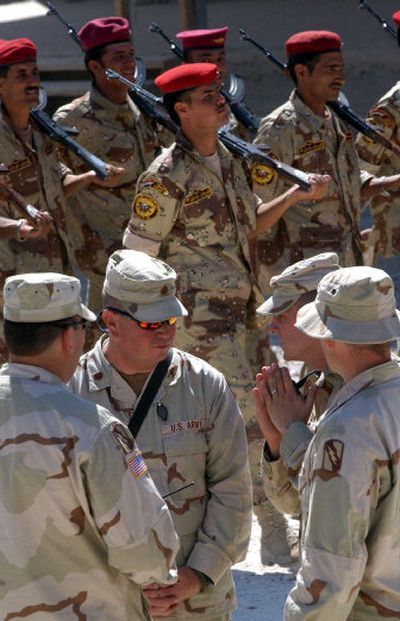U.S. turns Najaf base over to the Iraqis

NAJAF, Iraq – U.S. troops withdrew from this holy city in southern Iraq on Tuesday, an initial step in the military’s effort to pull back from the country’s urban centers and turn over authority to Iraqi forces.
Under waving Iraqi flags, U.S. commanders formally turned over control of Forward Operating Base Hotel, a square, concrete-walled American base on the edge of Najaf, a shrine city about 100 miles south of Baghdad that saw intense fighting last year.
“The Iraqi army is operating successfully throughout the region,” said Lt. Col. James Oliver, the outgoing base commander, as he handed over the ceremonial keys to the base. “They are fully independent and capable of responding to all security needs. We are now here in a strictly advisory mode.”
The handover of Najaf scarcely could have been imagined last summer, when thousands of American soldiers and Iraqi troops fought a pitched, three-week battle in the city against the militia forces of radical Shiite Muslim cleric Muqtada al-Sadr after the rebels seized control of several shrines. Hundreds died and much of the old city was destroyed.
Calm was restored after followers of Grand Ayatollah Ali Sistani marched on the city and brokered a resolution. Since then, violence has flared sporadically in Najaf – just two weeks ago six people were killed when clashes erupted between al-Sadr’s forces and another Shiite faction – but commanders decided the situation has stabilized enough to warrant Tuesday morning’s transfer of authority.
The withdrawal was partially symbolic because U.S. forces will maintain a sizable force at Forward Operating Base Duke, a much larger facility about 20 miles away.
But the move was an important psychological benchmark because the U.S. military presence in Iraq’s holiest city has long been a sore spot to Shiite Muslims both in Iraq and around the world.
Najaf police chief Gen. Abbas Karim Moadel hailed the turnover as “a historic moment” and a tribute to the growing capability of the Iraqi security forces.
The base, renamed Camp Karrar, is one of about two dozen turned over to the Iraqi security forces so far, U.S. Army Spokesman Lt. Col Steve Boylan said.
Despite Oliver’s statement that the U.S. remains only in an “advisory mode,” several Iraqi soldiers said they expected regular U.S. troops to continue regular patrols in Najaf. Boylan said it “remains to be seen” whether U.S. patrols in Najaf would continue.
Some Najaf residents expressed a hope that the American troops would stick around a while longer. A complete U.S. withdrawal from Najaf could spark a violent competition between different Shiite factions within the police and army, said Haidar Sayid Salman, owner of a stationery store in Najaf’s Old City.
“I trust them to fight terrorism, but their loyalty is not to the government,” Salman said, referring to Iraqi security forces. “I wish we were ready for (true independence), but we’re not.”
As the transfer of authority in Najaf proceeded Tuesday, violence continued in the capital and restive Al Anbar province.
In Baghdad, the two U.S. soldiers were killed and two others injured in the morning when their vehicle hit a makeshift bomb and rolled over.
On Monday, a Marine assigned to the 2nd Marine Division in Al Anbar was killed by an improvised explosive during combat operations in Ramadi, the military announced Tuesday. Names of the dead were withheld pending family notification.